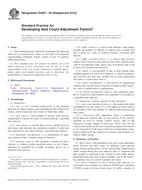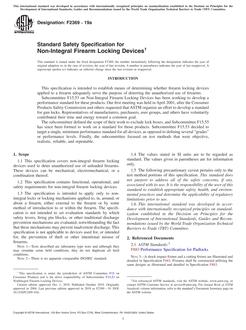1.1 This test method covers the use of automatic vapor pressure instruments to determine the vapor pressure of liquefied petroleum gas products at a temperature of 37.8°C, vapor to liquid ratio of 0.5:1, and pressures from 200 to 1550 kPa on a sample volume of 3.33 mL.
1.2 This test method is applicable to the determination of vapor pressures of liquefied petroleum gas products at temperatures from 37.8 to 70°C, vapor to liquid ratios of 0.1:1 to 4:1, and pressures up to 3500 kPa; however, the precision of the test method (see Section 15) has only been determined for a vapor to liquid ratio of 0.5:1, at a temperature of 37.8°C, and a pressure range from 300 to 1500 kPa.
Note 1 – This test method is not intended to determine the true vapor pressure of LPG samples, but rather determine and report the vapor pressure of LPG at the 37.8°C temperature and 0.5:1 vapor to liquid ratio as the Test Method D 1267 method.
Note 2 – This test method is not a true vapor pressure method and will not measure the full contribution from any dissolved gases such as nitrogen or helium if they are present. The contribution of light gases to the measured vapor pressure is highly dependent on the test temperature, type of gas, and V/L ratio of the test. A task group has been formed to determine or quantify the effect that the contribution of light gases have on the measured vapor pressure of LPG sample types as a function of the test temperature, type of gas, and V/L ratio of the test.
1.3 The values stated in SI units are to be regarded as standard.
1.4 This standard does not purport to address all of the safety concerns, if any, associated with its use. It is the responsibility of the user of this standard to establish appropriate safety and health practices and determine the applicability of regulatory limitations prior to use. For specific hazard statements, see Appendix X2.
Product Details
- Published:
- 12/01/2003
- Number of Pages:
- 5
- File Size:
- 1 file , 45 KB
- Redline File Size:
- 2 files , 79 KB


